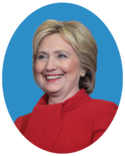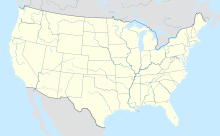2016 presidential election | |
  Nominees Clinton and Kaine | |
| Convention | |
|---|---|
| Date(s) | July 25–28, 2016 |
| City | Philadelphia, Pennsylvania |
| Venue | Wells Fargo Center |
| Chair | Marcia Fudge[1] |
| Keynote speaker | Elizabeth Warren of Massachusetts[2] |
| Notable speakers | Hillary Clinton Barack Obama Tim Kaine Bill Clinton Bernie Sanders Cory Booker Joe Biden Michelle Obama Nancy Pelosi Deval Patrick Michael Bloomberg Tulsi Gabbard Harry Reid Chelsea Clinton Kirsten Gillibrand Sarah Silverman Elizabeth Banks Sarah McBride |
| Candidates | |
| Presidential nominee | Hillary Clinton of New York |
| Vice-presidential nominee | Tim Kaine of Virginia |
| Other candidates | Bernie Sanders of Vermont |
| Voting | |
| Total delegates | 4,763 |
| Votes needed for nomination | 2,382 (Absolute Majority) |
| Results (president) | Clinton (NY): 2,842 (59.67%)[3] Sanders (VT): 1,865 (39.16%) Abstention: 56 (1.18%) |
| Results (vice president) | Kaine (VA): Acclamation[4] |
| Ballots | 1 |
| Republican Party | |
|---|---|
| Democratic Party | |
| Third parties | |
| Related races | |
| |


The 2016 Democratic National Convention was a presidential nominating convention, held at the Wells Fargo Center in Philadelphia, Pennsylvania, from July 25 to 28, 2016. The convention gathered delegates of the Democratic Party, the majority of them elected through a preceding series of primaries and caucuses, to nominate a candidate for president and vice president in the 2016 United States presidential election. Former U.S. Secretary of State Hillary Clinton was chosen as the party's nominee for president by a 54% majority of delegates present at the convention roll call securing it over primary rival Senator Bernie Sanders, who received 46% of votes from delegates, and becoming the first female candidate to be formally nominated for president by a major political party in the United States. Her running mate, Senator Tim Kaine from Virginia, was confirmed by delegates as the party's nominee for vice president by acclamation.
Delegates at the convention also adopted a party platform, through a voice vote, to take to the 2016 elections, touted as the "most progressive" platform in the Democratic Party's history. The progressive shift was often credited to Sanders and the influence of platform-committee members appointed by him. The platform featured a focus on economic issues, such as Wall Street reform, stronger financial regulation, and raising the minimum wage to $15 an hour. Liberal stances on social issues, such as a call for criminal justice reform and an end to private prisons, expansion of Social Security, and the abolition of the death penalty, also feature in the platform.
Senator Elizabeth Warren delivered the keynote address of the convention, with First Lady Michelle Obama and Bernie Sanders serving as headlining speakers on the first day. Former president Bill Clinton served as headlining speaker on the convention's second day, while Vice President Joe Biden and President Barack Obama headlined on day three. Tim Kaine gave his vice presidential nomination acceptance speech on the third day of the convention, while Chelsea Clinton introduced Hillary Clinton to give her presidential nomination acceptance speech on the final day. Clinton's speech was generally well received, and she would go on to have a 7% convention bounce in national polling. Various performers also appeared during the convention, including Elton John, Demi Lovato, Alicia Keys, Lenny Kravitz and Katy Perry. Overall attendance at the convention was estimated to be around 50,000, according to Anna Adams-Sarthou, a representative of the DNC Host Committee.[5]
The convention was not without controversy, as it was subject to various conflicts between supporters of the presidential campaign of Bernie Sanders and the Democratic Party. In the week prior to the convention, various emails from the Democratic National Committee, the governing body of the Democratic Party, were leaked and published, showing bias against the Sanders' campaign on the part of the committee and its chair, Debbie Wasserman Schultz. Schultz subsequently resigned as chair of the committee, and thus as chair of the Democratic National Convention, with Congresswoman Marcia Fudge taking up the role of Convention chair. Some delegates in support of Sanders staged protests both outside and on the floor of the convention, opposing the nomination of Clinton and Kaine as the party's nominees for president and vice president, respectively.
Clinton and Kaine would go on to win the popular vote in the general election, but ultimately lost the election to the Republican ticket of Donald Trump and his running mate Mike Pence in the electoral college.
- ^ Goist, Robin (July 24, 2016). "Rep. Marcia Fudge named Permanent Chair of 2016 Democratic National Convention". Cleveland.com. The Plain Dealer. Retrieved July 24, 2016.
- ^ Terkel, Amanda (July 25, 2016). "Elizabeth Warren to Keynote Democratic Convention". The Huffington Post. Retrieved July 25, 2016.
- ^ "Dem Convention Day 2 redacted tweets ... DAY 2 of the 2016 DEMOCRATIC NATIONAL CONVENTION met in the Wells Fargo Center: Philadelphia, Pennsylvania". Thegreenpapers.com. Retrieved July 27, 2016.
- ^ Keneally, Meghan; Struyk, Ryan (July 27, 2016). "Tim Kaine Nominated as the Democratic Vice Presidential Candidate". ABC News. Retrieved July 27, 2016.
- ^ Harrell, Donovan (July 26, 2016). "DNC by the numbers". Politico. Retrieved September 27, 2018.
